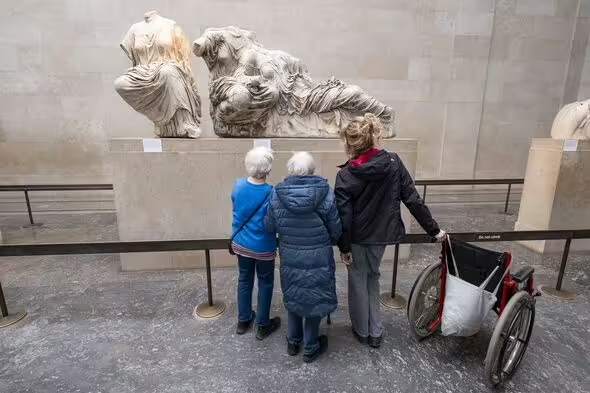A cross-party campaign including academics and lawyers have issued fresh demands that the British Museum abandon its hated plan to give the Elgin Marbles to Greece. MPs, peers, historians and a leading archaeologist are among those warning they “will not stand by” and allow Britain to lose a world-famous cultural asset, in a deal that may never see the marbles returned.
In a letter to the British Museum, organised jointly by archaeologist Dr Mario Trabucco and Great British PAC, numerous signatories declare: “We will not stand by while the Elgin Marbles are given away. They are British-owned and should remain at the Museum for the benefit of its visitors.” They have accused the British Museum of circumventing explicit legislation that bans them from handing back any artefacts, and argue that the campaign to give the sculptures to Greece has been “politically orchestrated, heavily financed, and increasingly shrouded in secrecy.”

Britain’s ownership of the marbles is under threat (Image: Getty)
“This is no longer a discussion of curatorial best practice—it is a full-scale political operation, and one that threatens the principles underpinning our national heritage institutions.
“The British Museum is not a plaything of ministers, lobbyists or magnates. It exists by law and by trust, for the benefit of the British public and the world—not for the satisfaction of sentimental diplomacy or nationalist agendas.”
The letter’s signatories also include former Prime Minister Liz Truss, Sir John Redwood, Sir William Cash, Oxford professor Lawrence Goldman, Cambridge professor Robert Tombs, and renowned historian Dr David Starkey.
The Elgin Marbles consist of more than 30 stone sculptures taken from Greece by Lord Elgin in the early 1800s, with the explicit permission of the then-Ottoman rulers.
Lord Elgin has been credited with saving them from destruction, as the Parthenon later became a dumping ground for ammunition and a target practice centre during the Second World War.

George Osborne is exploring loaning the sculptures to Greece (Image: Getty)
However despite Britain’s act of conservation, in 2022 the Greek culture minister accused Lord Elgin of “a blatant act of serial theft”.
In November 2023, British Museum chairman George Osborne, the former Chancellor, said he was looking forward to “a partnership with our Greek friends that requires no one to relinquish their claims.”
The scheme would see the sculptures loaned to Greece, though there has been little detail about how the UK would ensure their return when the loan period concludes.
Sir Keir Starmer is also under pressure to return them amid his push for an EU treaty reset, with former European Commission chief Margaritis Schinas saying it would symbolise a new era of “mutual respect and collaboration”.
He said: “Returning the Marbles would be a powerful symbol of Britain’s commitment to strengthening ties and turning the page on recent divisions.
“It’s time to close this chapter and open a new era of mutual respect and collaboration.”
Downing Street insists that the Government has “no plans to change the law that would permit a permanent move”.
However Sir Keir met with the Greek Prime Minister in December, with sources claiming progress had been made on the demands for a return.
The Prime Minister is also said to be less opposed to the move than his Tory predecessors, with Rishi Sunak cancelling a meeting with his Green counterpart in 2023 over accusations of “grandstanding” about the exhibition.
Dr David Starkey, one of the lead supporters of the letter sent to the museum, the Department of Culture, and the Prime Minister, said: “Before Lord Elgin brought them to London, knowledge of the sculptures’ appearance depended on a handful of engravings. Their arrival in Britain ignited a wave of neoclassical inspiration—from Buckingham Palace to the British Museum itself. To suggest they belong only to one country is to ignore the very cultural exchange that gave them meaning and preserved them.”
Dr Mario Trabucco della Torretta added: “We understand the Greek attachment to these sculptures, but this focuses solely on the moment of their creation, neglecting to tell a much richer cultural story. Their lawful acquisition is an early example of conservation, and it is in itself a cultural fact that had profound effects on British culture. This story deserves to be understood and respected just as much as their origin, and it is an essential part of our identity, both as Britons and as Westerners. No nation can claim a monopoly on that.”
A British Museum spokesperson said: “Discussions with Greece about a Parthenon Partnership are on-going and constructive. We believe that this kind of long term partnership would strike the right balance between sharing our greatest objects with audiences around the world, and maintaining the integrity of the incredible collection we hold at the museum.”


